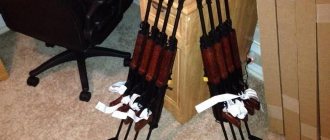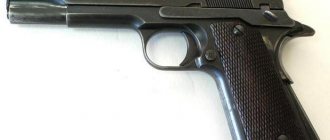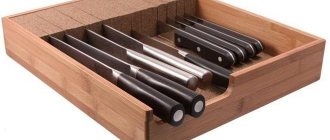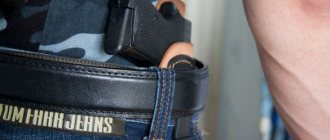ST 222 of the Criminal Code of the Russian Federation.
1. Illegal acquisition, transfer, sale, storage, transportation or carrying of firearms, their main parts, ammunition (with the exception of civilian smooth-bore long-barreled weapons, their main parts and cartridges for them, limited-kill firearms, their main parts and cartridges for him) -
shall be punishable by restriction of liberty for a term of up to three years, or forced labor for a term of up to four years, or arrest for a term of up to six months, or imprisonment for a term of up to four years with a fine in the amount of up to eighty thousand rubles or in the amount of wages or other income convicted for a period of up to three months or without it.
2. The same acts committed by a group of persons by prior conspiracy, -
shall be punishable by imprisonment for a term of two to six years with or without a fine in the amount of up to one hundred thousand rubles or in the amount of the wages or other income of the convicted person for a period of up to six months.
3. Acts provided for in parts one or two of this article, committed by an organized group, -
shall be punishable by imprisonment for a term of five to eight years with a fine in the amount of one hundred thousand to two hundred thousand rubles or in the amount of the wages or other income of the convicted person for a period of one year to eighteen months, or without it.
4. Illegal sale of civilian firearms smooth-bore long-barreled weapons, firearms of limited destruction, gas weapons, edged weapons, including throwing weapons, -
shall be punishable by compulsory labor for a term of up to four hundred eighty hours, or correctional labor for a term of one to two years, or restriction of freedom for a term of up to two years, or forced labor for a term of up to two years, or arrest for a term of three to six months, or imprisonment for a term of up to two years with or without a fine in the amount of up to eighty thousand rubles or in the amount of the wages or other income of the convicted person for a period of up to six months.
Note
. A person who voluntarily surrenders the items specified in this article is exempt from criminal liability under this article. Their seizure during the detention of a person, as well as during investigative actions to detect and seize them, cannot be recognized as voluntary surrender of the items specified in this article, as well as in Articles 222.1, 223 and 223.1 of this Code.
Commentary to Art. 222 of the Criminal Code
1. The subject of the crime in relation to Parts 1 - 3 is a firearm, its main parts, ammunition (with the exceptions specified in the disposition of the article), and in relation to Part 4 - civil firearms smooth-bore long-barreled weapons, firearms of limited destruction, gas and cold steel (including throwing) weapons (clauses 2 - 7, 9 - 10 of the Resolution of the Plenum of the Supreme Court of the Russian Federation of March 12, 2002 N 5 “On judicial practice in cases of theft, extortion and illegal trafficking of weapons, ammunition, explosives and explosive devices"). In this case, the subject of the crime is not only a weapon suitable for functional use, but also a faulty or training weapon, if it contained components suitable for use or if a person had the goal of bringing it into a suitable condition and took any actions to realize this intention.
2. From the point of view of the objective side of Art. 222 of the Criminal Code of the Russian Federation provides for two independent elements of crime.
The first of them (part 1) is characterized by alternatively provided actions in relation to the subject of the crime: a) acquisition; b) transfer; c) sales; d) storage; e) transportation; e) wearing. The content of the listed actions is disclosed in paragraph 11 of the Resolution of the Plenum of the Supreme Court of the Russian Federation dated March 12, 2002 No. 5.
3. Actions must be illegal, i.e. be carried out in violation of the rules for the circulation of relevant items established by law.
4. The second corpus delicti (Part 4) is described in the law as an action in the form of illegal sale of weapons specified in the disposition.
5. Note to Art. 222 of the Criminal Code of the Russian Federation provides the basis for exemption from criminal liability in connection with active repentance.
Why do you need a permit to carry bladed weapons?
The uncontrolled use of weapons on the territory of the state is fraught with the emergence of mass unrest and an increase in the level of street crime.
Therefore, control of the circulation of bladed weapons is an important area of law enforcement. And one of the main methods is the provision of permits to citizens to carry and store weapons. In particular, the law limits the conditions for the legal acquisition of weapons. These include:
- availability of official permission from law enforcement agencies to own knives and other identifiable items;
- if you need to carry a weapon with national costumes or special types of uniforms.
Issuing permits to own weapons is necessary for the following purposes:
- keeping records of weapon owners;
- selection of candidates based on medical documentation and practical training;
- reducing the number of persons who can obtain consent to perform the procedure.
In addition, the list of objects whose use is illegal is strictly limited. These include:
- all types of products with a blade length greater than 90 cm;
- if the blade can be removed from the handle by a sudden movement or by triggering.
Violation of any of these conditions provides for liability under the Criminal Code of Russia.
https://youtube.com/watch?v=obYkjAAKqyU%3Ffeature%3Doembed
Second commentary to Art. 222 of the Criminal Code of the Russian Federation
1. The subject of the crime provided for in Part 1 of Art. 222, - firearms, their main parts, ammunition (with the exception of civilian smooth-bore long-barreled weapons, their main parts and cartridges for them, limited-kill firearms, their main parts and cartridges for them).
Smooth-bore weapons, pneumatic weapons, signal, starting, construction and installation pistols and revolvers are not included in the subject of the crime (Part 1 of Article 222).
A faulty or training firearm can only be recognized as the subject of this crime when the perpetrator had the intention and real opportunity to bring it into a condition suitable for shooting or contained usable components.
2. The objective side is characterized by the commission of at least one of the illegal actions listed in Part 1 of Art. 222.
The acquisition of these items means receiving them into permanent or temporary possession by any means. Transfer means their temporary assignment to other persons who do not own the named items. The sale of these items should be understood as their irrevocable (as opposed to illegal transfer) alienation into the ownership of other persons as a result of any illegal transaction (compensated or gratuitous), i.e. sale, donation, exchange, etc. Storage means actual possession of them, regardless of the specific location (in a home, outbuildings, in a special hiding place, etc.). Transportation refers to the actions of moving these items, regardless of the method of transportation, but not directly in front of the accused. Carrying occurs in cases where the perpetrator secretly or openly keeps them with him, i.e. in clothes or directly on the body of the accused, as well as carrying them in a bag, briefcase, etc.
Listed in Part 1 of Art. 222 actions are considered illegal if they are committed in violation of the rules for the circulation of weapons, ammunition, explosives, explosive devices established in regulations.
The crime is completed from the moment of committing any of the actions specified in the law.
3. The subjective side is characterized by direct intent.
4. The subject of the crime is a person who has reached the age of 16 years.
5. In part 2 of Art. 222 establishes liability for an act committed by a group of persons by prior conspiracy, and in Part 3 of Art. 222 - by an organized group.
6. In accordance with Part 4 of Art. 222 of the Criminal Code punishes the illegal sale of civilian smooth-bore long-barreled weapons, weapons, firearms of limited destruction, gas weapons, edged weapons, including throwing weapons.
To purchase and store gas weapons in the form of pistols and revolvers, you must obtain a license. Mechanical sprayers, aerosols and other devices filled with tear and irritant substances are also classified as gas weapons, but can be purchased freely. In Russia, the circulation of any gas weapons equipped with nerve agents, poisonous or other substances that can cause harm to health is prohibited.
7. In accordance with the note to Art. 222, a person who voluntarily surrendered the subject of a crime is exempt from criminal liability if his actions do not contain another crime.
Their seizure during the detention of a person, as well as during investigative actions to detect and seize them, cannot be recognized as voluntary surrender.
In cases where an administrative offense committed by a person (for example, violation of the rules for storing or carrying weapons and ammunition, their sales, untimely registration and re-registration of weapons, etc.) also contains signs of a criminal offense, the specified person can only be brought to administrative liability .
Responsibility for storing smooth-bore weapons without a license
What sanction is provided for those persons who violated the state regulations for the storage of smooth-bore weapons? Citizens who used a smoothbore gun without the permission of the authorized bodies bear liability established by Criminal Law. Typically, the violators are rural hunters who, without proper documentation, keep their equipment.
It is important to remember that equipment, even with a license, must be stored in a special room away from accessibility. For example, if a person purchased a hunting rifle and hid it in his room under the bed, then his actions can be classified as unlawful
The law prohibits storing weapons in living rooms where minor children may have access to them.
Foreigners who purchased civilian or military weapons on Russian territory have the right to use them within 10 days from the date of issue of the license.
Persons who are prohibited from storing smooth-bore weapons:
- Minor citizens.
- Citizens who do not own weapons.
- Incapacitated persons.
Since smooth-bore guns are mostly used for hunting purposes, in practice, offenses related to their storage are often classified under Article 224 “careless storage of firearms.”
The disposition clearly reveals the concept of negligence. Storage with access to others is considered negligent. It is the concept of access to unauthorized persons that the legislator uses as the main qualifying feature. As for sanctions, they differ significantly from those listed in Article 222.
The concept of negligence is qualified by the legislator as a less dangerous phenomenon for society than illegal possession. Hence the punishment is more humane. Negligent storage is generally punishable by a fine of up to 40 thousand rubles.
Types of weapons
Information about the main types of weapons is contained in the Law “On Weapons”.
All shooting devices, according to the legal act, are divided into the following types:
- civil;
- official;
- hand-held rifle (combat).
The classification is made based on the operating principle of the firing mechanism of each type of gun. Let's look at them in detail.
Civilian weapons
In the hierarchy of weapons, it is considered the safest. This type of weapon is intended exclusively for peaceful purposes. It is mainly used as a means of self-defense.
In addition, it is allowed to use civilian weapons in leisure or for hunting, as well as for certain sports. According to general rules, the magazine design should hold no more than 10 rounds, and fire should be carried out exclusively in single shots.
An exception to the rule is a sports weapon, in which it is allowed to use cartridges in accordance with the regulations of the sports organization. It is also prohibited to use ammunition intended for combat models in civilian equipment.
Civil models also have their own classification:
- Gas weapons (mechanical sprayers, gas pistols, aerosol sprayers).
- Firearms with a limited range (mostly a pistol).
- Shotgun. A variety created for hunting. Mainly used with a smooth barrel. However, the law allows the use of a rifled barrel with a diameter of no more than 140 mm.
- Sports weapons. Designed for use in various sports.
- Rare models. This type of weapon is usually used by collectors who collect a wide variety of models of shooting devices.
The Law on Weapons, in addition to the listed models, also includes bladed weapons, stun guns and antique guns in the list of civilian types.
Service weapon
Service equipment differs:
- technical parameters;
- circle of persons who are allowed to use it.
The “weapons” law states that only law enforcement officials can use service weapons. In addition to officials, it can be used by employees of various departments that perform law enforcement functions.
Service equipment includes: firearms, smoothbore, a model which has both a long and a short barrel. The dual energy must be within 300 J. As with civilian weapons, it is prohibited to fire in bursts. Identification characteristics of cartridges must differ from analogues in combat equipment.
Military small arms
The most powerful type of weapon, which is necessary to solve large-scale problems in the form of state defense. Intended for the army and other units providing defense functions. The circulation of combat equipment is clearly regulated by the Government of the Russian Federation.
Due to its high lethality, the weapon cannot be used for self-defense, since its use can seriously damage human health or lead to death.
Why do you need a permit?
In order for a citizen to properly store a smooth-bore weapon, as well as use it legally, he needs a license. Without this document, it is not possible to purchase the necessary gun and ammunition. Responsibility for carrying without permission and documents provides not only an administrative fine, but also deprivation of the opportunity to obtain a permit for several years.
In order not to break the law and obtain a license, you must:
- First, decide on the brand and draw up an application for the licensing and permitting department.
- Prepare all documents.
The application must be accompanied by:
- A certificate stating that the applicant has completed a training course on weapons storage and successfully passed the exam.
- Conclusion that a person’s knowledge of the safe handling of a shotgun was tested.
- Medical certificate.
- Photos.
- Hunting license (if a hunting rifle is purchased).
- On the right about paying the state duty.
In order to receive a certificate of passing the exams, you must complete a training course at a special training center. The duration of training is 3–4 months. As for the medical report, the future gun owner needs to undergo such specialists as a psychiatrist, narcologist, ophthalmologist, etc.
Important! Only one weapon can be purchased per license. One person can receive a total of 5 licenses at a time
The citizen’s application is considered within 10 days, after which he is sent a notification with a decision. The license is valid for six months. During this time, a civilian can purchase the desired weapon. But the design doesn't end there.
Next, you need to contact the LRO again (2 weeks after purchase are given for this) and exchange the license for a permit. The storage conditions of the gun will be checked, after which the person will be issued a permit. It is valid for 5 years, and after this period it can be extended.
A license may be refused for the following reasons:
- age (less than 18 years);
- incorrectly completed application;
- absence of any document;
- a conviction for an intentional crime or a large number of administrative offenses;
- lack of permanent residence;
- refusal to take training courses.
If a license has been refused, under no circumstances should you purchase a weapon illegally. Such a violation may result in administrative or criminal penalties.
https://youtube.com/watch?v=BYrq6BuO2gk%3Ffeature%3Doembed
What is illegal storage
Illegal possession of traumatic weapons is determined by the presence of a license - a document that confirms the right of a particular person to use a gun. A license is issued only to mentally healthy people who provide the necessary package of documents. Before obtaining a license, a person must also provide a special storage place and equip a so-called safe. This safe should limit access to the traumatic pistol for children and third parties.
Often, law enforcement officers observe a situation where, having received a license for a gun and having purchased it, people put it up for sale on the Internet. At the same time, they give the traumatic pistol to others for a certain amount, regardless of whether they have a license. By purchasing a gun this way, you may find yourself under the law and liable. In order not to answer under Art. 222 for the illegal acquisition of traumatic weapons, you must obtain a license in advance of purchasing a gun.
Any gun, regardless of its type, is subject to mandatory registration with the police. Registration is closely related to the place of registration, so if you do not have your place of residence registered in your passport, you may run into trouble. The number of the traumatic pistol is entered into the observation file and from that moment the length of ownership of the weapon is calculated. They issue a permit to store and use a gun for a period of 3 to 5 years. After this period, the owner is required to renew the license. If you change your place of residence, you must notify the police within two weeks and reissue your license regardless of its expiration date.
When renewing a license, the owner will face a fine, as well as the inability to obtain a license renewal for one year.
To obtain permission, you need to submit a written application to the local police department, provide a certificate of completion of courses in handling a gun, a certificate from a doctor about mental health, as well as a number of other documents, a list of which can be asked directly from police officers.
It should be noted that even after equipping a safe and providing the necessary documents, employees of the governing body may refuse a license. Permits are not issued to people under 18 years of age, persons registered in a mental hospital, those with previous convictions, persons suffering from epileptic seizures or having other health limitations. Those who have committed more than two administrative offenses during the year will also not receive a license. Problems may arise with obtaining a license for persons with visual acuity below 0.5 in one eye and below 0.2 in the other, as well as in the absence of the thumb and index finger or three fingers on one of the hands.
What is this
There is no legal concept of “traumatic weapon” in the Russian legal framework.
The conceptual apparatus of the Federal Law “On Weapons” contains a definition of firearms of limited destruction and classifies them as:
- short-barreled;
- trunkless.
The purpose of application is to hit a living creature mechanically without causing death. Method of application - throwing a cartridge case with a traumatic effect, which may have a powder or other charge.
Specifications must meet the following criteria:
- the charge cannot exceed ten rounds;
- the energy output at the moment of firing from the muzzle of a pistol, revolver and other type of tram cannot exceed 91 Joule;
- country of origin: Russia.
Since this means of self-defense does not have a lethal effect, it is considered one of the types of civilian weapons.
Is it possible to use a weapon without a license?
There are some types of weapons that also do not require a license to use. This is a so-called self-defense weapon. In addition to air pistols, there is no need to obtain permits for:
- gas cartridges;
- stun guns;
- edged weapons, etc.
If we talk about an air pistol, then, by law, you can actually own one without a license. But there are nuances. For example, in self-defense they can only frighten the attacker. If the owner shoots, he may injure a person, and for this he may be held liable on the basis of one of the articles of Chapter. 16 of the Criminal Code of the Russian Federation.
The most common types of weapons for self-defense are gas canisters and stun guns. They are used primarily to neutralize an attacker. An alternative can be edged weapons, that is, knives, axes, etc.
But they should be used with great caution, as exceeding self-defense will result in criminal penalties.
When purchasing a pistol, you should take care of obtaining a special permit, since without a license you can get a prison sentence
On the other hand, it is important to be careful when using it in self-defense. Exceeding self-defense can be regarded as unlawful actions, and this often ends in a suspended or real sentence for the owner
Checking control services
Let’s assume a situation where a person carrying this type of weapon is intoxicated.
The punishment for illegally carrying weapons will be:
- if a law enforcement officer refused to undergo a medical examination procedure;
- If the person refuses, he will be charged with violating the rules of carrying weapons.
The liability will be deprivation of the right to purchase for 12 to 24 months. Accordingly, the person will be deprived of both a license and means of self-defense.
But there are routine checks by police officers of persons who own traumatic weapons. The main goal of this type of inspection is to control the storage method.
When visiting a residential building in which a licensee resides while he or she is away from the premises, officers will ask to present the weapon to verify license plates. Moreover, if family members resort to such a trick, the licensee will lose the weapon with the wording “failure to comply with storage conditions.”
No one other than the person who received the permit can know where the key to the safe or the code for opening the safe is located, otherwise the inspection by the control services will be accompanied by confiscation.
General information about storage
Violation of the procedure for storing bladed weapons does not entail the application of legal sanctions. This is due to the fact that there are no strictly legal rules on how to store such products. But the following universal rules can be identified:
- mandatory presence of covers;
- insulate the product out of the reach of children and third parties (it is better to use a safe or a lockable cabinet).
But they can be punished for illegally carrying or manufacturing bladed weapons. You can authorize the transportation of such weapons:
- persons who require knives in the performance of official duties;
- if the products are necessary for use in hunting, but only during the period of permission to hunt;
- military, if the product is an award or trophy;
- antique items, but only during cultural events;
- as self-defense.
All other cases of exploitation may be subject to legal sanctions.
Important! Not in every case you will need a permit to operate and possess bladed weapons. For example, hunters who have a firearms permit also have access to the sale of knives.






